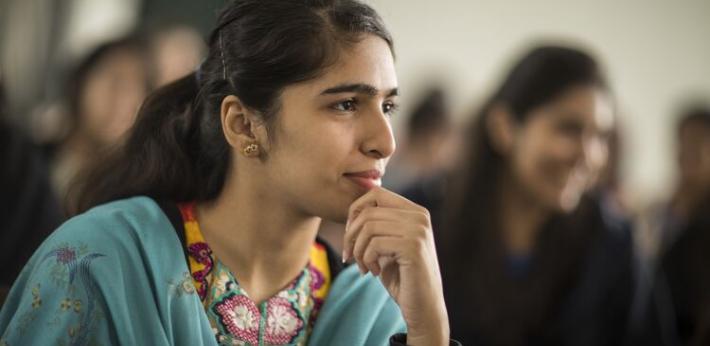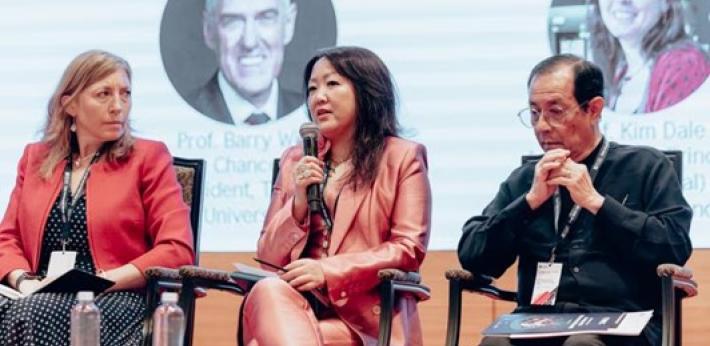
Develop a blended leadership programme consisting of five to six months of online and face-to-face sessions in the UK. The programme will potentially accommodate up to 30 participants - five senior officials from Central Board of Secondary Education (CBSE) and the remainder from affiliated schools/ sister organisations.
The content of the module needs to be developed in consultation and partnership with British Council and CBSE and other nodal agencies as required by Ministry of Education in India. The consultation can be in the form of an orientation session offering a glimpse of the different topics and skills that the university proposes to cover through online, self-access and face to face residential sessions and study visit to the UK. Key topics that the course is expected to cover are listed below (but not limited to):
- Develop an understanding of a range of innovative and effective assessment strategies that provide accurate insights into student learning. This understanding will help manage the introduction of new assessments, support teachers in their implementation, and analyse achievement data to effectively address and narrow attainment gaps. Implement strategies to enhance teacher motivation and job satisfaction.
- Foster a supportive and collaborative school environment.
- Promote active involvement of parents and the local community in the educational process.
- Develop partnerships that support student learning and school/community improvement initiatives.
- Introduce innovative management practices that align with the demands of the 21st century.
- Focus on environmental consciousness and sustainability, preparing students to tackle climate change challenges.
- Ensure inclusive education practices that cater to the needs of all students, including those with special needs.
- Promote diversity and create an inclusive school culture.
In summary, this course should support:
- Adapting to Modern Educational Needs: Equip educators with the tools and knowledge to meet the dynamic and complex challenges of contemporary education.
- Enhancing Student Outcomes: Improved assessment practices lead to better understanding of student needs, fostering enhanced learning outcomes.
- Achieve agreed Sustainable Development Goals: Align educational practices with global goals, including quality education, climate action, and reduced inequalities.
Expected outcomes:
- Participants increase their knowledge and skills in instructional leadership, allowing them lead learning in their schools and improve the quality of teaching as well as engage effectively with broader educational communities.
- Participants increase their knowledge and skills in instructional leadership, allowing them lead learning in their schools and improve the quality of teaching as well as engage effectively with broader educational communities.
- Strengthening participants' assessment skills enabling leaders to lead the improvement and enhancement in pedagogical skills and subject knowledge through the use of instructional leadership techniques.
- Stregthening collaborative decision-making, teamwork, and communication skills, enabling participants to actively take on school improvement initiatives as outlined by the NCF-SE.
- Overall, contribute to capacity building efforts aimed at improving the quality of education delivery as per the recommendations of NCF-SE.
Expected outputs:
- Design and deliver a set of modules, to build the capacity of CBSE school leaders and officials to achieve the expected outcomes above.
- Design and deliver a relevant one week face to face capacity building initiative in the UK including field visits to schools and related agencies/institutions like Ofsted, education and examination boards, etc.
- Certificate (co-branded) on succefully completing the course.
- Relevant tools for effective monitoring and evaluation of the project including records of training and feedback.
- A comprehensive end of project report to be submitted to the British Council covering the design of the course, delivery (online and face-to-face), review and feedback.
Training approach:
The recommended training approach involves a blended delivery model, combining face-to-face and online interactions and support training materials (hard and soft copy). Training hours for face-to-face are tentatively six hours a day, across six days. The course to include pre- and post-program assessments, project work, and a capstone presentation to measure participants' progress and learning outcomes.
Timelines:
- Online – to begin in September/October 2024
- Face-to-face – April 2025
For details on budget, eligibility, duration, selection criteria and other relevant details kindly refer to the attached document.
How to apply?
Please fill this form to submit your expression of interest on or before 23 August 2024 23.55 UK time.
All mandatory fields in the form should be completed and submitted, this will be crucial for shortlisting stage.
Applications received after closing date will not be accepted.
Instructions for this call
If you have any queries with respect to the application or the scope of work, please do write to fatima.anwar@britishcouncil.org on or before 16 August 2024. We will collate all questions and share an FAQ document.
- Shortlisted applicants could be invited for a meeting to further discuss the proposed application.
- Only shortlisted applicants will be intimated via email in the week commencing 26 August 2024
| Attachment |
|---|
| Leadership development programme.pdf |



